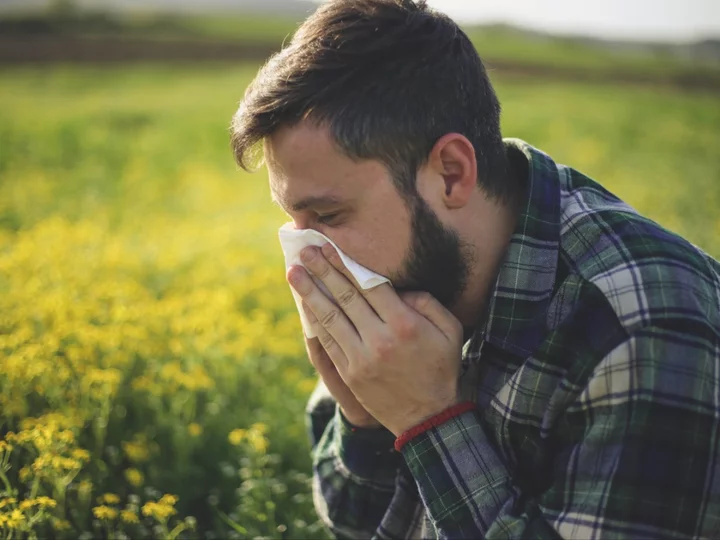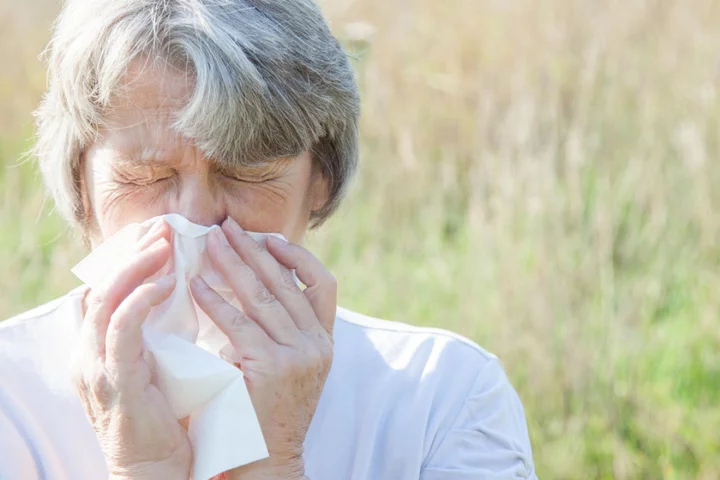
Why do we get hay fever and what are the symptoms?
A runny nose, watery eyes, sneezing, coughing – whatever your hay fever symptoms, it’s no surprise if you’ve had a flare-up recently. During spring, both tree and grass pollen is released into the air. If you’re allergic to the proteins they contain, your nose, eyes, throat and sinuses can become swollen, irritated and inflamed. “Many people are suffering from hay fever just now because the pollen count is high, thanks in part to climate change,” says Dr Nisa Aslam, GP from Typharm’s Skin Life Sciences Foundation. “Plus the pollen season is getting longer.” The immune function plays an important role in an allergic reactions, she explains. “People who suffer from hay fever often have a family history of not just hay fever, but also skin conditions such as eczema or psoriasis, which can often be borne out of problems with the immune system.” The weather can also be a contributing factor in how badly you’re affected. “Some hay fever sufferers may be experiencing a sudden spike in their symptoms a bit earlier than usual, this may be due to the recent prolonged wet and windy weather,” says Claire Nevinson, superintendent pharmacist at Boots. “On a daily basis, rainfall tends to decrease pollen, but over a period of months, intermittent wet days tend to produce a more severe hay fever season overall.” Conditions could be about to get even worse. A recent study by the University of Worcester, published in the Science of The Total Environment journal, warned that it could be one of the worst seasons for birch pollen on record. The severity is due to two things. “Firstly, higher than average temperatures last June, when the pollen is produced, allowed greater potential for high pollen levels,” says Dr Beverley Adams-Groom, senior pollen forecaster at the university. “Secondly, birch trees have a biennial pattern of pollen production, one mild year and one severe year, and this year was already expected to be a high year.” So what can you do if your hay fever is much worse than usual at the moment? The first step is to avoid exposure to the pollen that affects you the most. “Allergens responsible for hay fever include grass pollens and tree pollens [spring and summer], weed pollens and fungal mould spores,” says Dr Aslam. “Watch the daily pollen forecasts. Don’t go outside when the pollen count is high and keep all windows shut.” Preventive medicines can help to reduce symptoms if you know in advance when you’re going to be exposed to pollen. “This can be a steroid nasal spray one to two weeks before symptoms start,” says Dr Aslam. Alternatively, natural nasal sprays “can help to prevent the symptoms of hayfever and other types of allergic rhinitis by forming a protective film in our inner nose, stopping allergens that we breathe in from trying to enter our respiratory system”, she says. Similarly, ointments like Vaseline can act as a pollen trap. “Apply a barrier balm of petroleum jelly around your nose to trap the pollen and help relieve dry and uncomfortable skin from repetitive nose blowing,” Ms Nevinson says. “Shower and change your clothes after you have been outside to wash pollen off and wear wraparound sunglasses to stop pollen getting into your eyes.” Read More Seasonal allergies tips and tricks as pollen count rises What is the link between pollen and eye infections? Hay fever may be mistaken for Covid, warns expert Why do heatwaves in the UK feel hotter than abroad? The startling and grim discoveries unearthed by the climate crisis Earth’s CO2 hits highest recorded level in human history
2023-05-20 01:49

Why is my hay fever so bad at the moment?
A runny nose, watery eyes, sneezing, coughing – whatever your hay fever symptoms, it’s no surprise if you’ve had a flare-up recently. During spring, both tree and grass pollen is released into the air. If you’re allergic to the proteins they contain, your nose, eyes, throat and sinuses can become swollen, irritated and inflamed. “Many people are suffering from hay fever just now because the pollen count is high, thanks in part to climate change,” says Dr Nisa Aslam, GP from Typharm’s Skin Life Sciences Foundation. “Plus the pollen season is getting longer.” The immune function plays an important role in an allergic reactions, she explains. “People who suffer from hay fever often have a family history of not just hay fever, but also skin conditions such as eczema or psoriasis, which can often be borne out of problems with the immune system.” The weather can also be a contributing factor in how badly you’re affected. “Some hay fever sufferers may be experiencing a sudden spike in their symptoms a bit earlier than usual, this may be due to the recent prolonged wet and windy weather,” says Claire Nevinson, superintendent pharmacist at Boots. “On a daily basis, rainfall tends to decrease pollen, but over a period of months, intermittent wet days tend to produce a more severe hay fever season overall.” Conditions could be about to get even worse. A recent study by the University of Worcester, published in the Science of The Total Environment journal, warned that it could be one of the worst seasons for birch pollen on record. The severity is due to two things. “Firstly, higher than average temperatures last June, when the pollen is produced, allowed greater potential for high pollen levels,” says Dr Beverley Adams-Groom, senior pollen forecaster at the university. “Secondly, birch trees have a biennial pattern of pollen production, one mild year and one severe year, and this year was already expected to be a high year.” So what can you do if your hay fever is much worse than usual at the moment? The first step is to avoid exposure to the pollen that affects you the most. “Allergens responsible for hay fever include grass pollens and tree pollens [spring and summer], weed pollens and fungal mould spores,” says Dr Aslam. “Watch the daily pollen forecasts. Don’t go outside when the pollen count is high and keep all windows shut.” Preventive medicines can help to reduce symptoms if you know in advance when you’re going to be exposed to pollen. “This can be a steroid nasal spray one to two weeks before symptoms start,” says Dr Aslam. Alternatively, natural nasal sprays “can help to prevent the symptoms of hayfever and other types of allergic rhinitis by forming a protective film in our inner nose, stopping allergens that we breathe in from trying to enter our respiratory system”, she says. Similarly, ointments like Vaseline can act as a pollen trap. “Apply a barrier balm of petroleum jelly around your nose to trap the pollen and help relieve dry and uncomfortable skin from repetitive nose blowing,” Ms Nevinson says. “Shower and change your clothes after you have been outside to wash pollen off and wear wraparound sunglasses to stop pollen getting into your eyes.” Read More Seasonal allergies tips and tricks as pollen count rises What is the link between pollen and eye infections? Hay fever may be mistaken for Covid, warns expert Why do heatwaves in the UK feel hotter than abroad? The startling and grim discoveries unearthed by the climate crisis Earth’s CO2 hits highest recorded level in human history
2023-05-20 00:16

Millions ditched cars for bikes during the pandemic. These cities want the habit to stick
During the worst of the pandemic, outdoor recreation surged as people took up pursuits to escape isolation
2023-05-19 23:48

Luxury Resort on Dubai’s Palm Islands Close to Selling For $280 Million
Anantara The Palm Dubai, a luxurious resort on one of the city’s famous artificial tree-shaped islands, is close
2023-05-19 21:58

IFF Weighs Sale of $1 Billion Lucas Meyer Cosmetics Unit
International Flavors & Fragrances Inc. is weighing a sale of a unit making ingredients for the cosmetics and
2023-05-19 21:29

Target recalls nearly 5 million Threshold candles after severe burns, lacerations reported
Target is recalling almost 5 million candles over laceration and burn hazards, according to a Thursday notice from the U.S. Consumer Product Safety Commission
2023-05-19 21:26

Southern Tide and Lilly Pulitzer Launch South Carolina-Inspired Capsule Collection
GREENVILLE, S.C.--(BUSINESS WIRE)--May 19, 2023--
2023-05-19 21:15

F1 announces donation to flood relief operations in Emilia Romagna
Formula 1 is donating €1million (£868,000) to the relief operations in Emilia Romagna following the cancellation of the race at Imola this weekend. F1 was forced to cancel round six of the 2023 season due to the adverse weather and flooding which has affected the region in the past few weeks. While missing out on the hosting fee of approximately £20m as a result of the Emilia Romagna GP not taking place, F1 has now announced a donation to the relief effort. A press release also confirmed that food and water from the circuit, teams and hospitality on-site has been donated to a group organising food banks and distribution for those who have been affected by the floods. The death toll from this week’s floods has risen to 13, with rescue crews attempting to reach towns and villages in northern Italy, with local mayor Monica Rossi warning the situation will be “tragic” if rainfall continues. F1 president Stefano Domenicali, who is from the region, said upon the race’s cancellation on Wednesday: “It is such a tragedy to see what has happened to Imola and Emilia Romagna, the town and region that I grew up in, and my thoughts and prayers are with the victims of the flooding and the families and communities affected. “I want to express my gratitude and admiration for the incredible emergency services who are working tirelessly to help those who need help and alleviate the situation – they are heroes and the whole of Italy is proud of them. “The decision that has been taken is the right one for everyone in the local communities and the F1 family as we need to ensure safety and not create extra burden for the authorities while they deal with this very awful situation.” The Independent understands the race is unlikely to be rescheduled this year due to the already congested 2023 calendar. Read More F1 Emilia Romagna Grand Prix cancelled after heavy flooding in region Will Imola Grand Prix be rescheduled? Lewis Hamilton and Mercedes are the biggest losers from Imola Grand Prix cancellation
2023-05-19 20:48

10 things you should know about living with a stoma
Musician Tom Speight was diagnosed with the long-term bowel condition Crohn’s disease 15 years ago. After undergoing emergency surgery for the condition , he had a stoma connected to his digestive system. As today marks World Inflammatory Bowel Diseases Day (IDB), Speight has opened up about the realities of living with a stoma and debunks 10 common misconceptions about his condition. A stoma is an opening on the abdomen that can be connected to either your digestive or urinary system to allow waste to be diverted out of your body. Stomas are sometimes used after surgery to remove cancers in your pelvic area or help treat inflammatory bowel diseases, such as Crohn’s disease or ulcerative colitis. How does Crohn’s impact on your life and mental health? Over the years, [there have been some] really difficult situations to deal with – I was hospitalised last year while I was making my album, and lying in hospital, not knowing if I was going to be well enough to finish what I’d been working so long and so hard for was really really demoralising. For me, stress is a big trigger, so when you’re stressing about keeping up with everything and keeping on top of things it was actually making me worse. There’s a ripple effect to this disease in that your limitations can affect how others [family and friends] live their life,” he said. “I’ve been having regular therapy since 2019 to help manage my stress and improve my mental health. Working out how to manage the condition is unbelievably frustrating. Finding the right team of doctors, the right medication, and the right diet is such a draining process. For me, one of the hardest parts is knowing that despite everything you try, the trial and error process you go through can ultimately put you back in hospital if it’s not quite right. It can be a scary thought. The prospect of having a third operation or a sixth stay in hospital is always there, at the back of my mind. Here are the 10 most common misconceptions about living with a stoma, according to Speight: 1. Swimming is fine Often people believe that having a stoma means you can’t enjoy the same hobbies and activities that you did before you had the operation. Swimming comes to mind first: I think people presume you’ll have a leakage or accident, but in the 10 years I’ve had the stoma. I’ve never once had a problem. The stoma bag is waterproof and secure due to its adhesive. There’s no reason why a person with a stoma can’t swim with confidence. 2. What you can and cannot eat When I first spoke to my stoma nurse, I asked about my dietary requirements and what to avoid... you’d be surprised about what’s on the forbidden list. Some people may be advised to avoid eating very fibrous foods, or foods with tough outer skins such as sweetcorn, popcorn, peas and potato skins, to avoid causing a blockage in the bowel. Often eating out can feel like a game of Russian roulette. I’ve had many episodes where I’ve been caught out and been absolutely floored in the process. 3. Being visible I was 24 when I first had the emergency surgery to have a stoma. At the time, I thought having the operation would mean my career was over... you can’t be a pop star and have a bag, right? In reality, no one actually will know until you tell them. I’ve worn tight-fitting clothes while channelling my best Freddie Mercury moves and it’s never been a problem. I kind of wish I could tell my younger self that things will be ok and it’s not the end. In some ways, it was just the start, because it gave me a whole new lease of life. 4. ‘Only elderly people have stomas’ I originally thought only old people have stomas, and yes, the elderly are more likely to have a stoma, but surgery can be performed on anybody at any age. I’ve met a number of younger people through the charity Crohn’s & Colitis UK who are just like me, and it’s quite comforting to know you’re not alone. 5. Sex Without being too graphic, this isn’t a problem. It’s all about finding the right partner who can make you feel safe and confident. 6. Smell A lot of the misconceptions about having a stoma were things I initially thought too. I thought it would be unhygienic and, quite frankly, not smell so fresh. The reality is, you’ll only ever notice the smell when you go change it in the toilet. In some ways, it would be no different from anyone else using the loo 7. Is this permanent? For some patients, a stoma is permanent. However, for many, an ostomy is performed to allow for the bowel to heal from scarring, inflammation and infection. I personally need to get to a level of health where a reversal could be performed, while also managing to take some time off to heal properly. 8. ‘You can’t exercise’ I think this misconception might be because people might think you’re vulnerable or weak due to the operation. Exercising regularly can have a really positive impact on people with a stoma, as it reduces the risk of a hernia and keeps your body fit. I’ve never felt stronger in my life. 9. Find the nearest toilet I think people often think you’re walking around with poop all day... this isn’t the case! You just have to go to the toilet like everyone else. 10. The reality is... Yes, it’s a life changing operation but with a few mindful changes you can lead a happy and healthy life. Just avoid the popcorn and drink plenty of water. Read More Ninety-five per cent of Black adults don’t swim – meet the people trying to change that How being seduced by gambling’s love bombing ended with a prison sentence ‘Unproblematic people don’t age’ reflects the stupidest kind of beauty standard Woman, 50, to become a surrogate mother for same-sex couple Doctors dismissed her as a hypochondriac. Then came an incurable diagnosis Festival founder hopes to help tackle women’s health taboos
2023-05-19 20:25

Wall Street Built a $370 Billion Business Cloning Quant Trades
Deep in the bowels of Wall Street there’s a surprisingly successful counterfeiting operation underway: The world’s largest banks
2023-05-19 20:20

Woman, 50, to become a surrogate mother for same-sex couple
A woman is going to be a surrogate mother for the fourth time at the age of 50, even though the birth could be the ‘hardest yet’. Dawn Allen, a surrogate applications and agreement co-ordinator for Surrogacy UK, who lives in Derbyshire with her husband, Matthew Allen, 51, an archivist’s assistant, and has two of her own children, Alex, 17, and Sam, 27, offered to become a surrogate for the first time at the age of 36 after being inspired by a documentary over 20 years ago. Dawn has had three surrogate babies and three unsuccessful attempts, one of which ended in miscarriage, but all of her births have been “moments that will stick with (her) forever”. She was unsure if she was going to do it again until she met a friendly couple, Nicky Spence, 39, an operatic tenor and broadcaster, and Dylan Perez, 33, a classical pianist, through Surrogacy UK. Dawn makes sure her husband is on board with the surrogacies and bonds with the intended parents, as he is “as much a part of this as (she is)”, and has to “support” her through the pregnancy. She is not too worried about her age affecting her likelihood of becoming pregnant and has said she “wouldn’t have offered if I didn’t feel physically able” but is aware that the birth could be the hardest yet. “I know it’s going to be hard because I’m older now, but, at the end of the day, nine months out of my life is nothing when you’ve got a chance to give parents a lifetime of happiness,” Dawn said. Dawn was first drawn to becoming a surrogate more than 20 years ago, explaining: “I watched a documentary in the late 90s all about surrogacy and I thought, one day I’m going (to) do that. “I met Matthew, my husband, 23 years ago, and about a month into dating I said, ‘Oh, by the way, one day I’m going to be a surrogate’ – he looked at me like it was completely crazy.” Before Dawn became a surrogate, she had two sons of her own. She said: “About 18 months after having Alex, I brought the subject up about surrogacy, and we looked into it.” In 2008, Dawn joined Surrogacy UK, the UK’s leading not-for-profit surrogacy organisation, and soon began to use their online platform for surrogates and intended parents, as well as going to face-to-face socials, to see if she could find a couple she connected with. Dawn explained: “It’s just about meeting up with people and finding people that you connect with and have things in common with. “You then have a getting-to-know phase, where you hang out with the intended parents for about three months, and then you can make the decision if you’d like to proceed.” Dawn’s husband was very supportive of her decision, and she thinks it is important he connects with the intended parents too. She said: “Matthew is my main support – he’s as much a part of this as I am. “He’s the one that’s got to support me, as well as my children, so it’s important to me that they all get on with the people we decide to help.” A year after signing up to Surrogacy UK, in 2009, Dawn had an unsuccessful surrogacy as the embryos were of poor quality, but in 2012 she had a surrogate baby for a same-sex couple, using her own egg. An attempt to help a third couple in 2013 failed, but in 2015 she gave birth to a daughter for a same-sex couple – the same year, she began working for Surrogacy UK as a surrogate applications and agreement co-ordinator as she wanted to help other surrogates and intended parents. In 2017 Dawn miscarried a surrogate baby, but that couple has since had two children with another surrogate, and in 2021 she had a surrogate baby for another same-sex couple. Dawn explained how she has felt after giving birth: “I think, for me, it’s one of those moments that will stick with me forever. “You’re seeing people that you’ve become really good friends with, become parents, and you’re there in the moment they get to look at their child for the first time and hold them for the first time,” she said. “It was really, really emotional – there were lots of tears every time.” Dawn never felt it difficult to give the baby to the intended parents, explaining: “It was very clear in my head that baby wasn’t mine – it was the intended parents’ pregnancy, it was their baby. “I think you bond with your intended parents more than the baby.” Now, aged 50, Dawn is hoping to become a surrogate again, after meeting same-sex couple Nicky Spence and Dylan Perez on Surrogacy UK’s platform in November 2022. She explained: “I hadn’t made my mind up 100% if I was going to do it again, but I started chatting to Nicky and I asked my husband if he’d like to come along to a social online to meet them. “They were both lovely and my husband thought they were really nice too, so I made them the offer to start the official getting-to-know period the next day.” Nicky added: “We feel so lucky to have become friends with Dawn through Surrogacy UK and when she offered to help complete our family we couldn’t believe it. “We feel in very safe hands as she’s the kindest and most experienced surrogate you could wish for. ” Dawn did not have any doubts about her age affecting the likelihood of her getting pregnant. “So luckily, we’re using the same clinic that I used in my last journey, so they know my medical history,” she said. “Yes, I’m a lot older now, but after all the checks and tests they’ve done, they’re happy with me from a medical viewpoint. “I wouldn’t have offered if I didn’t feel physically able.” After doing some background digging on the future fathers, Dawn discovered that Nicky is an opera singer and broadcaster and his husband, Dylan, is a classical pianist. Dawn’s last surrogate baby was Luca, who was also for someone in the public eye – Aled Haydn Jones, the head of BBC Radio 1, and his partner, Emile Doxey. She said: “I have been teased about I only do celebrities now. But I had no idea that they were quite well known – I just knew Dylan played the piano and Nicky was a singer. “Nicky has performed with Shirley Bassey and lots of other people.” From November 2022 to February 2023, Dawn, her husband and the two intended parents have been getting to know each other. Dawn said: “We hang out all the time, they come and stay at our house or we meet up for meals, we’ve even been to Berlin with them and ended up in a bierkeller.” I think the pressure comes from, we want it as much as they do Dawn Allen In January 2023 they drew up an agreement regarding the pregnancy and the birth, and everyone was happy to proceed. Now, embryos are being created, using the intended parents’ family member’s eggs, and Dawn is hoping to get pregnant in the next few months. Dawn said: “I’m feeling really positive, there’s no pressure from them at all, but I do sometimes put a bit of pressure on myself because I really want to give them a baby. “I think the pressure comes from, we want it as much as they do.” Dawn thinks it is unlikely that she will have another surrogacy, saying: “I think this has probably got to be it with my age. “I think the only way I could do it was if we got pregnant really quickly this time around, and Nicky and Dylan wanted the baby to have a sibling more or less straight away.” Read More ‘You always feel like you’ve done something wrong’: Why UK surrogacy laws need a ‘real overhaul’ Children born via surrogacy or egg or sperm donation ‘should be told when young’ Tom Daley unveils photographs of newborn son Phoenix Rose: ‘He’s just perfect’ Charity boss speaks out over ‘traumatic’ encounter with royal aide Ukraine war’s heaviest fight rages in east - follow live
2023-05-19 19:50

Festival founder hopes to help tackle women’s health taboos
Pelvic floor problems and periods will feature as topics for discussion alongside live music, food and drinks at a festival with a difference this summer. Surgeon Julie Cornish, founder of the Everywoman Festival due to take place in Cardiff next month, said she believes it is the first event of its nature to take place in the UK covering such a wide range of women’s health topics. The mother of three, who specialises in pelvic problems after childbirth, said she hoped to create a relaxed and informal setting where typically taboo subjects can be tackled. She said: “The concept of it is as much about prevention and education, as it is about signposting to women with problems. “I’m not aiming this just at women who’ve got problems, I want 16-year-olds to come along to find out about period sustainability products, what is normal for periods and how to know when you’ve got endometriosis. “I want people to understand what is normal and not normal about aspects of women’s health, particularly pelvic health. And I’d like them to be more comfortable talking about their bodies and the symptoms they might get.” Cornish said she is “all too aware of the barriers people face when trying to start conversations about their health” as she warned that if people do not feel able to speak about their health, they may not be able to access the help they need. The event on June 24 at Insole Court in the city will feature a range of expert speakers and more than 48 interactive workshops including pilates, physio sessions and chair yoga, as well as live music, performance art sessions, food and drinks. Welsh health minister Eluned Morgan is set to take part in a discussion on the day on gender health inequality, while some of the other sessions will focus on sexual wellbeing and childbirth injury. For too long, there have been deep-seated and entrenched inequalities in women’s healthcare Welsh health minister Eluned Morgan Morgan said: “For too long, there have been deep-seated and entrenched inequalities in women’s healthcare – from how women’s experiences are viewed to how symptoms are acted upon; health issues and conditions affecting women have been considered ‘taboo’ subjects, limiting awareness and understanding, resulting in women often suffering in silence. “I am committed to improving women’s experiences and health outcomes. “I’ve tasked NHS Wales with designing and delivering a 10-year women’s health plan, which will address inequities in provision and barriers to access and improving the provision of good-quality health services for women throughout their lives. “But if we are to truly deliver lasting change for all women in Wales, we need to look beyond the boundaries of healthcare and normalise conversations about women’s experiences, taking co-ordinated action to remove gender barriers and inequalities. “I am delighted to be speaking at the Everywoman Festival and I look forward to hearing the experiences of all those attending.” Read More Charity boss speaks out over ‘traumatic’ encounter with royal aide Ukraine war’s heaviest fight rages in east - follow live Get to know Foday Dumbuya, winner of the Queen Elizabeth II Award for British Design 7 beauty changes to make as the weather gets warmer Paparazzo says Harry and Meghan car chase was ‘catastrophic experience’
2023-05-19 18:27
